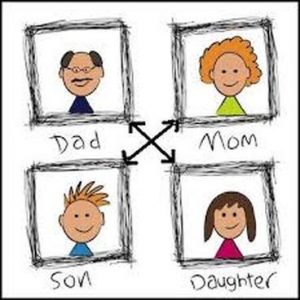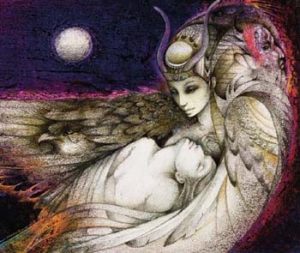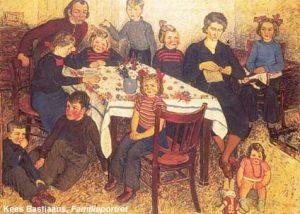incest

Incest means sexual contact with a relative. The word incest originates from the Latin word ‘incastus’ which means ‘unchaste”. As the word suggests, incest is generally considered to be an bad thing. With certain exceptions, it is avoided by humans as well as animals.
Why is incest forbidden?
The answer to this question is to be found in evolution. The offspring of two individuals who are not relatives is usually stronger than the offspring of two individuals from the same group or gene pool. The reason is that parents who come from the same group are more likely to share any possible genetic deficiencies, which are then inherited by their offspring. Reproduction within the same group, or ‘inbreeding’ as it is called, tends to reinforce hereditary anomalies. Although generally avoided, incestuous marriage was stimulated among royal families in some ancient cultures. Even in modern times, there is a tendency among the upper classes and royalty to marry and breed within a small social circle. This has sometimes resulted in deleterious effects. A famous example is the prevalence of haemophilia among male offspring of Queen Victoria, who died in 1901.
Exogamy
Thus incest, especially among members of the same family (which may be quite extended), is avoided by individuals, and outlawed in most cultures, just as it is generally avoided among the higher animals. Sexual partners are sought outside the family. This explains the special excitement that is provided by parties, public festivities, travelling abroad, and many other instances of xenophilia, the desire to meet with strange experiences and people. The search for a partner outside one’s own group is called exogamy. It has existed ever since prehistoric times, and has become part of our genes. It is now a congenital characteristic of human beings. Society plays its part and stimulates exogamy whenever possible. Incestuous marriages are prohibited by law. Usually these laws apply to first-degree relatives, but sometimes also extend to second- or third-degree relatives (cousins, uncles, aunts, grandparents), and in some cultures even to more distant relatives and to in-laws
The incest taboo
The prohibition of incest is to a high degree entrenched in our individual and social life. It causes aversion within the family, and has led to rigid regulations and harsh punishments by law. Because of this, we hardly speak about incest. The subject has become taboo. The word ‘taboo’ has Polynesian origin, and means ‘sacred’ or ‘untouchable’. Things that are taboo cannot be talked about rationally, often because they are deeply rooted in our natural fears. The members of a family are usually not sexually attracted to each other. Feelings of desire tend to be aroused by unfamiliar people rather than by those we know well. In spite of this, sexual desire is sometimes directed towards relatives. Most siblings play sexual games These games are often short-lived and only happen occasionally, but they are triggered by feelings of sexual desire. This makes them a kind of exercises. Sexual attraction also occurs between fathers and daughters, and mothers and sons. Men find younger women attractive. A father experiences a diminished attraction to his wife and finds his daughter attractive during her adolescent years. The daughter can be attracted to her father because other men are out of reach or frightening.. Mothers are less often attracted to their sons. This is because women are generally focussed on older men with typically male characteristics. This is why feelings of desire that a son has for his mother often remain unanswered, are repressed and become guilt-ridden. Probably the most famous history of the sexual relation between a mother and her son is Sophocles’ tragedy about King Oedipus.
Father and daughter incest
Incest is therefore most often practised between father and daughter, both in real life and in the imagination of girls and men alike. The abhorrence, which as said above has its roots in our nature, results in strong social disapproval. In former days, incest was punishable by death. Nowadays there is still strong disapproval and severe punishment, even though our society calls itself ‘modern’ and ‘sexually liberated’. The disapproval of incest, especially between father and daughter, is a classic example of ‘projection’. The alleged reason for disapproval is that incest is the same as sexual abuse, ill-treatment, aggression and violence. These are all rational arguments, but they are used to justify an irrational opinion. In fact, most cases of incest have little to do with violence or ill-treatment. During the sixties and seventies, contraceptives became widely and publicly available, which allowed people to have sex without the risk of pregnancy. More and more people had sex before and outside marriage. So some people argued that it was no longer necessary to disapprove of sex between relatives, because the risk of inbreeding had disappeared. This led some to practise and promote ‘family sex’. In a number of cases, family sex led to abuse, which caused a reaction against sexual liberalism. This reaction became stronger in the 1980s and led to the dominant association of incest with child abuse. Thus the old and primitive horror of incest (sex between relatives of any age) continues today under the guise of, and appealing to, the natural condemnation of child abuse (a term which itself has come to refer more and more to sexual relations rather than mistreatment). Thus the term ‘incest’ has acquired an entirely different and inappropriate meaning. The power of propaganda and systematic misinformation works in our society just as effectively as it did fifty or a hundred, or ten thousand years ago.
